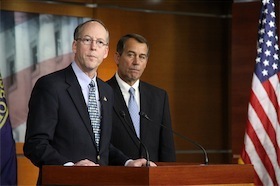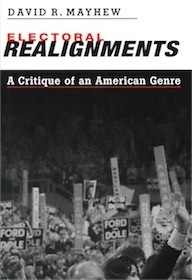Matthew Yglesias's Blog, page 2511
November 2, 2010
Liberal Overreach at the Margin
It's inevitable that "liberal overreach" will be blamed for Democratic losses if they're large tonight and also blamed if they're small. But what I think overreach analysis always requires is more of a marginal approach.
For example, granting ad arguendum that the 111th Congress engaged in liberal overreach, which Senators who win today would have lost had the Affordable Care Act included a public option linked to Medicare? The answer seems to me to be nobody. Which Senators who win today would have lost had the 111th Congress passed a cap-and-trade plan through reconciliation? Here, it looks like Patty Murray. Would a "scaled back" health care plan have saved Blance Lincoln? Clearly not.


There's No Such Thing as a Realignment
The worst thing that happens after most US elections is that people begin to debate whether or not the election in question is/was a "realignment" election.
So when I saw that Stan Collender had a post titled Beware of Those Who Call This Election a Realigment" I was excited. But instead of his argument being the correct one that this is a bogus concept, he's saying "It may well be a realignment, but anyone who uses that word tonight, tomorrow, or in the next few months to characterize the 2010 election will either be guessing or spinning."
What you really need to do with realignment-mongering pundits is suggest they read David Mayhew's Electoral Realignments: A Critique of an American Genre in which he persuasively argues that there's no meaningful "realignment" phenomenon. There's a good short summary here if you're interested. To give my own summary, Mayhew's point is that there's no dichotomy between two "kinds" of elections. There's just a lot of elections. Some are more important than others, especially in retrospect. Sometimes a party wins a bunch of elections in a row. Sometimes a voting bloc switches partisan loyalties on an enduring basis. But there's no "pattern" in which these things all go together. Stuff just happens. Partisan majorities are usually fleeting.
People gaze at the stars and see constellations, but that just goes to show that human intelligence plus random occurrences equals pattern-detection not that there's some deep underlying structure to the heavens that's painting pretty pictures for us.


GOP Record of Deficit Reductions Illustrates the Point that Conservatives Don't Care About the Deficit
Megan McArdle says neither party is "particularly credible" on the deficit:
Looking at our small group of post-1980 presidents, we have two GOP presidents who increased the deficit, one GOP president who took major steps to close it, one Democratic president who took steps to close it. The "Dems good, GOP bad" has another problem, of course: Barack Obama., the Democratic president who has set spending records as revenue collapse.
This is unfair to Barack Obama for reasons I hope Ezra Klein will explain.
More to my interests since this is an ideologically driven non-partisan blog, I can take note of the fact that George HW Bush's excellent record on deficit reduction is a great illustration of the point that conservatives don't care about the deficit. After all, what do conservatives think about George HW Bush? They hate him! And what specifically do they hate about him? They hate his deficit reduction package! Blind partisanship is a strong force in American life, but in the particular case of Papa Bush and the deficit, it's something conservatives are able to overlook in favor of their passionate lack of concern about the budget deficit. Anyone who gave any weight whatsoever to the idea that deficit reduction is an important issue would have to think that HW Bush looks like a pretty good president. And anyone who wants to be a member in good standing of the conservative movement needs to think that HW Bush was by far the worst of the post-Carter Republican presidents.


Monetary Policy à La Krugman
Paul Krugman's preferred monetary policy strategy:
What I'd do if I were really in charge of the Fed, however, is the same thing I advocated for Japan way back when: announce a fairly high inflation target over an extended period, and commit to meeting that target.
What am I talking about? Something like a commitment to achieve 5 percent annual inflation over the next 5 years — or, perhaps better, to hit a price level 28 percent higher at the end of 2015 than the level today. (Compounding) Crucially, this target would have to be non-contingent — not something you'll call off if the economy recovers. Why? Because the point is to move expectations, and that means locking in the price rise whatever happens.
Sounds good to me. I don't totally understand this argument, however:
It's also crucial to understand that a half-hearted version of this policy won't work. If you say, well, 5 percent sounds like a lot, maybe let's just shoot for 2.5, you wouldn't reduce real rates enough to get to full employment even if people believed you — and because you wouldn't hit full employment, you wouldn't manage to deliver the inflation, so people won't believe you.
Right now we're very far from full employment. But we still have a little inflation. And so it seems to me that if real rates go down a bit, we'll get a bit closer to full employment, and thus a bit more inflation. The result would be a much slower than necessary recovery, but still better than the current path.


The Iron Law of Growth

(cc photo by Bert K)
Via Ryan Avent, the Economist reviews Roger Pielke, Jr:
The dilemma is that policies to reduce carbon-dioxide emissions have so far been singularly unsuccessful. Mr Pielke expresses the essence of this failure as what he calls the "iron law" of climate politics: "When policies focused on economic growth confront policies focused on emissions reduction, it is economic growth that will win out every time."
You hear people say things like this as if they're very profound all the time. But is there any other field of human endeavor in which it would make sense to broadly and lazily theorize that the current policy status quo is optimized for growth and always will be? It seems to me that when policies focused on economic growth confront policies focused on other things people care about the "other things" win all the time. We have national parks, we give seniors Medicare instead of turning them into soylent green, we have insane cotton subsidies, you need a license to become a barber, we underinvest in early childhood education, the tax code is a joke, etc.
Indeed, there are a lot of policies that would boost growth and cut emissions (less regulatory curtailment of dense construction, congestion pricing on roads, etc.) and yet "other things" win out over those options regularly.


Immigration and the Reddish Yellow Menace
If you try to work out Brad DeLong's midterm questions you'll see that if China ever does overtake the US in per capita GDP terms, it'll take a very long time for it to happen. At the same time, China's much larger population means they can overtake us in total output much faster than that.
For most purposes, of course, the per capita figure matters much more. Aggregation doesn't change the fact that individual Indian people are incredibly poor. But in terms of the struggle for geopolitical dominance, the aggregate does matter. Which leads me to wonder why national security hawks aren't out there more aggressively making the case for higher levels of immigration.
The US population is already growing at a faster rate than China's. And the extent to which this continues to be the case has major implications for China's ability to overtake us in total economic output. And thanks to the immigration channel, this is something we have the ability to control rather easily. According to Gallup, there are 165 million people around the world who say they'd like to move here, and Canada is the second most-popular hypothetical location. Not being much of a nationalist, I don't see this as being close to the top of the list of good reasons to make the country more open to immigration. But insofar as many people do have nationalist convictions, it's worth noting that there's a tradeoff between the nationalist impulse to seal the borders and the nationalist impulse to prolong the period of American hegemony.


Official Election Predictions Post

When all the votes are counted, I think there'll be 232 House Republicans. They'll be joined by 49 Senate Republicans, which is going to set off an interesting frenzy of efforts to entice Senators Nelson, Lieberman, Landrieu, and Pryor to switch parties but I forecast that coordination problems—only works if two jump—will frustrate Republicans. Meanwhile, egomaniacal senate moderates will be frustrated to discover that the legislative process now consists primarily of negotiations between Barack Obama and the House GOP.
This reversion to a balance of political power that leaves Democrats in a stronger position than they were as recently as the 2005-2008 period will be treated by the press as a world-historical shift in favor of the right. Most press figures will probably explicitly note that election results are invariably over-interpreted and then proceed to over-interpret again, arguing that this time it's different.
Interestingly, changes in state legislature turn out to be highly correlated with House outcomes so the GOP will get a big upper hand in the redistricting process.


November 1, 2010
Endgame
You are never there:
— I bought a LivingSocial deal for Indique and will benefit if I can persuade you to click the link and do the same.
— You'll have to await tomorrow for my Official Election Predictions.
— Ben Bernanke could fix the economy pretty quickly.
— All about FreedomWorks.
— Pundit bingo.
— Have presidential administrations gotten too unwieldy?
La Sera, "Never Come Around"


Congress and Subprime Lending
Hot off the presses is the first effort I've seen at a systematic examination of the political economy of subprime lending:
At the peak of the recent housing boom, subprime mortgage companies were loaning $600 billion per year to homebuyers with poor credit histories. In The Political Economy of the Subprime Mortgage Credit Expansion (NBER Working Paper No.16107), co-authors Atif Mian, Amir Sufi, and Francesco Trebbi explore the links between the rapid growth of the subprime industry and Congressional politics and policy. Focusing on the period between 2002 and 2007, they document a sharp increase in campaign contributions and lobbying activity by the mortgage industry. Using data from the Center for Responsive Politics, the researchers find that the industry's campaign contributions increased somewhat between 1998 and 2002. But they began to accelerate rapidly in 2002, and rose by 80 percent between 2002 and 2006. Moreover, the study finds that these contributions were targeted to members of Congress whose districts included a large fraction of subprime borrowers.
The researchers study legislators' votes on more than 700 bills that related to housing — specifically, bills tagged by the Congressional Research Service as related to "affordable housing," "home ownership," and "subprime." They find that over time, campaign contributions became a stronger predictor of representatives' voting. Similarly, the fraction of a legislator's district that consisted of subprime borrowers – as measured by consumer credit scores from Equifax – also became a more powerful explanation of voting patterns over time. The correlation between the concentration of subprime borrowers and voting patterns was greater in 2004, when subprime credit was beginning to flow, than in 1996, when subprime mortgages were still a small share of the overall mortgage market.
A lot of commentary I've read on the crisis seems to me to overlook this kind of issue. Tough regulatory action against an asset bubble is always going to be extremely difficult politically because the bubble has very concrete stakeholders. Imagine how legislators of both parties from Nevada and Florida would have screamed if the Bush administration had tried to crack down in a serious way.


The Conservative Establishment's Addiction to Tactics
Mike Allen and Jim Vandehei have a piece about the conservative elite's massive anxiety over Sarah Palin:
Many of these establishment figures argue in not-for-attribution comments that Palin's nomination would ensure President Barack Obama's reelection, as the deficiencies that marked her 2008 debut as a vice presidential nominee — an intensely polarizing political style and often halting and superficial answers when pressed on policy — have shown little sign of abating in the past two years.
"There is a determined, focused establishment effort … to find a candidate we can coalesce around who can beat Sarah Palin," said one prominent and longtime Washington Republican. "We believe she could get the nomination, but Barack Obama would crush her."
, I find these arguments to be not all that convincing. John McCain was a widely admired war hero with a reputation for moderation who had favorable ratings well over 50 percent on Election Day and he lost to a first-term senator with a black nationalist spiritual mentor. Palin isn't the most formidable candidate out there, and in a very close election her flaws could easily deny the GOP the White House. And very close elections do happen—think how important the 2000 presidential election was in retrospect. But most elections aren't that close, and if the fundamentals are strongly against Obama—which they may be—Palin will beat him.
I think the dirty secret of conservative Palin skeptics is that they think Sarah Palin would be a bad president. A little while back, Dave Weigel did a good article about conservative reformers whose books about the GOP's need to moderate are now looking bad in light of the way Republicans are roaring back in the midterms. It made me think that the real issue here, similarly, is that these authors actually think Bush-era policies were bad for America and more moderate ones would be better.
Ever since I read it, I've been fascinated by the line in National Review's endorsement of Mitt Romney which said "Our guiding principle has always been to select the most conservative viable candidate."
I wouldn't deny that progressives are prone to a certain amount of tribalism in our internal deliberations, but that kind of explicit ideological maximalism closes off debates on the merits in a weird kind of way. And not only do you see much more ideological maximalism in conservative media, but conservative media is a much more influential force than progressive media. This makes it extremely difficult for arguments on the merits to get off the ground which, in turn, makes it hard to mount persuasive arguments against candidates who you think may be wrong on the merits.


Matthew Yglesias's Blog
- Matthew Yglesias's profile
- 72 followers










